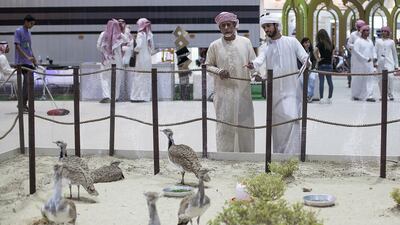ABU DHABI // Among the displays of guns, hunting gear and occasional stuffed lion, visitors to this year’s Abu Dhabi International Hunting and Equestrian Exhibition (Adihex) can also find animal conservation agencies.
While the event might not seem the most logical place for such organisations, the animal experts and hunters both believe it is in their mutual interests to promote the protection of wildlife.
“Many people don’t understand that we, as hunters and fishermen, are more concerned with protecting wildlife than the average person,” said Ahmed Al Ghuferi, a hunting enthusiast from Ras Al Khaimah.
Mr Al Ghuferi has gone on hunting trips abroad and mostly fishes in the UAE.
“This is our sport so, of course, if we shoot everything then we will have nothing to fish, nothing to catch,” he said, “Most of us respect the laws, but we need to make them more concrete.”
Mohammed Al Baidani, director general of the International Fund for Houbara Conservation, said that the Government is working to tighten the country’s hunting regulations.
“This is what the Government of Abu Dhabi is doing now,” said Mr Al Baidani, whose organisation has helped the houbara population increase by 48,000.
“A few months ago, a decree was made to start organising official hunting grounds because there is still no clear law about hunting.”
He believed most hunters respected the suggestions of the UAE’s founding President, Sheikh Zayed, that the highway from Al Ain to Abu Dhabi should demarcate the hunting grounds.
“From that highway to the west, hunting is not allowed. Anything to the north and north-east it’s also allowed and that’s how falconers work,” he said.
While the regulations are being drawn up, Mr Al Baidani believes the IFHC and other environmental organisations must educate hunting enthusiasts.
“When they launched the hunting exhibition, we at IFHC were pleased to hear about it because for us it is very important to find an event where we can be in contact with the biggest number of hunters,” said Mr Al Baidani, who has been attending Adihex since its inception 13 years ago.
Furthermore, conservation of the animals is in the interest of both conservation organisations and hunters.
Mr Al Baidani said that it was his organisation’s role to impart information to hunters on the species and to educate them in how to practice sustainable hunting.
“It is our role to highlight to them the breeding seasons and the hunting areas,” he said.
The IFHC also had to “emphasise that traditional forms of hunting are the best”.
Mr Al Baidani quoted Sheikh Zayed, who said that it is important to practice prudence and not over-consume the wildlife.
“The funny thing is hunters are conservationists themselves, they have to have animals to hunt, so it’s in their vested interest to make sure that populations stay healthy,” said Dr Majid Al Qassimi, director of terrestrial wildlife at the Environment Agency Abu Dhabi.
Dr Al Qassimi said that it is in the mutual interest of hunters and wildlife conservation groups to make sure that the necessary actions are taken to ensure the continuation of all animal species.
nalwasmi@thenational.ae

